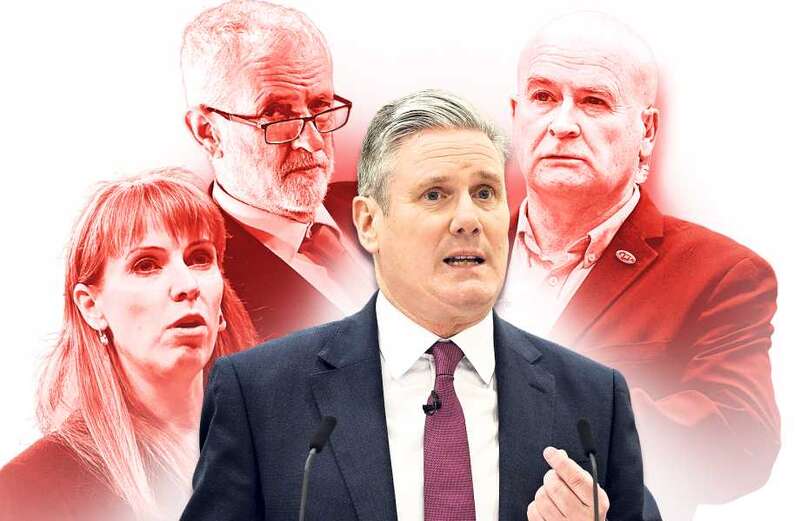AT the start of this week, Captain Keir set out on what he hoped would be an easy trip across a tranquil stretch of water.
Cheered on by a large flotilla of commercial boats, the voyage seemed an ideal chance to show off his shiny new vessel and compare it with the Tories’ old rust bucket, which was barely seaworthy and was now sinking rapidly after its skipper accidentally set off an explosion in its hull.


Yet, rather than enjoying a successful journey that enabled him to trumpet his business support, Captain Keir found himself in choppy waters that exposed the vulnerability of his craft and his own leadership.
On the Bank Holiday, he could be seen on the bridge, struggling against the rhetorical waves that battered the side of the ship.
At the heart of this assault were the two essential questions that have long bedevilled Labour leaders.
 From tongue scraping to saying no, here are 12 health trends to try in 2023
From tongue scraping to saying no, here are 12 health trends to try in 2023
“Are you a socialist?” and “is Labour a socialist movement?”
Sir Keir Starmer wanted to proclaim his achievement in winning over a large number of capitalists — the 120 business executives who had written an open letter of support — but instead the media was more interested in whether Sir Keir was still intent on the overthrow of capitalism.
Never the most inspiring speaker, Starmer sounded ill at ease as he tried to emphasise his patriotic centrism.
“I would describe myself as a socialist and a progressive who always puts the country first and the party second,” he told the BBC.
This defensive tone is very different to the full-blooded socialism he espoused when he ran for leader in 2020.
“I’ve always been motivated by a burning desire to tackle inequality and injustice, to stand up for the powerless against the powerful.
That’s my socialism,” he said, adding that the “free market has failed” so Labour should be the party “that supports common ownership”.
Sir Keir’s awkwardness mirrors the conflict that has always existed within the Labour Party over its attachment to socialism, which has been both its galvanising force and an agent of disaster.
For much of its history Labour was frank about its devotion to this ideology, as highlighted by the controversial Clause Four of its constitution drawn up in 1918, which committed the party to public control of the economy.
The brilliant administrator Herbert Morrison, one of the architects of the renowned post-war Government that built the NHS and the welfare state, argued that Labour was synonymous with this cause.
 How to de-clutter if you have a beauty stash to last you a lifetime
How to de-clutter if you have a beauty stash to last you a lifetime
“Socialism is what a Labour Government does,” he said with blinding simplicity.
Even Tony Blair felt compelled to pose as a keeper of the ideological flame, despite getting rid of the original Clause IV.
“My kind of socialism is a set of values based around social justice,” he once said.
In the same vein yesterday, Shadow Business Secretary Jonathan Reynolds asserted that his political principles were inspired by his Christian Socialism.
Yet this obsession with socialist credentials has done enormous damage to Labour, and to Britain, whenever the party has held office.
For the truth is that, beyond the academic discussions about the definition of the term, socialism is an ugly, destructive creed that has always resulted in poverty, oppression, division and waste wherever it has been tried.
In the Soviet Union, the gulag and the bread queue were the twin symbols of its disastrous failure, just as, in East Germany, the Berlin Wall and the Stasi were the emblems of its tyranny.

Even in its milder form in Britain, it has always led to economic crisis, trade union bullying, fiscal meltdown and bloated officialdom, never more so than under the Labour government of 1974 to 1979, when Britain became known as “The Sick Man of Europe” because of national addiction to strikes, punitive taxation, crippling debts and sky-rocketing inflation.
The 70s Labour Government boasted that it was the most socialist in history, but in practice that meant rubbish was left uncollected in the streets and bodies were left unburied at cemeteries because of industrial action.
State bureaucracy
At one point the income tax rate on dividends was an incredible 98 per cent, while in 1979, 29million days were lost to strikes.
As Margaret Thatcher, who brought this nonsense to an end, famously declared: “The problem with socialism is that eventually you always run out of other people’s money.”
Sir Keir would argue that those dark days are not going to return.
He claims to have proved his moderation by winning so many endorsements from leading businesses and by kicking his predecessor as leader, the quasi-revolutionary Marxist Jeremy Corbyn, out of the Labour party.
But in reality socialism is ready to rear its head again.
It can be seen in the proposed expansion of trade union power, in the focus on identity politics, in the tax attacks on private education and in the vast, threatened growth of state bureaucracy.
Among the litany of new quangos and public bodies that Labour is planning to set up are: a Great British Energy company, an Industrial Strategy Council, a Border Security Command, a Council for Economic Growth, a Skills England organisation, an Integrity and Ethics Commission, a new National Infrastructure and Service Transformation Authority and an Office for Value for Money, which sounds like a joke given the proposed spread of regulation, officialdom and union domination.
When Labour campaigners boast today of their belief in socialism, that should be seen not as a source of pride — but a warning to the electorate.




































